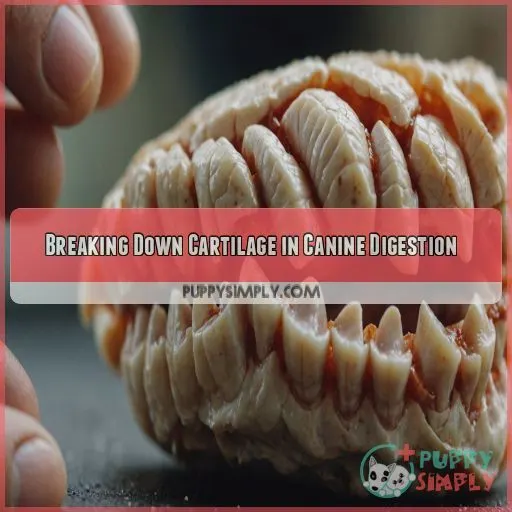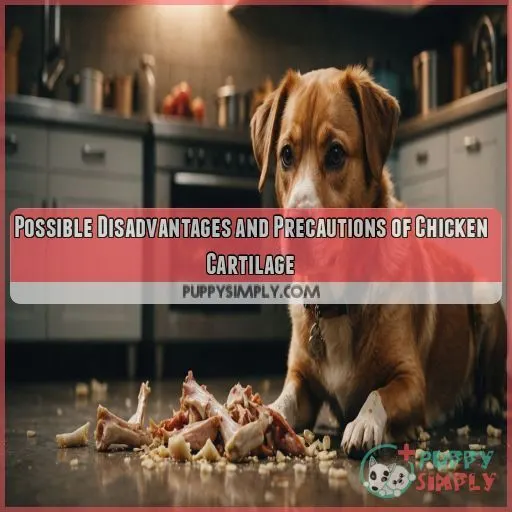This site is supported by our readers. We may earn a commission, at no cost to you, if you purchase through links.

The short answer is yes, dogs can eat chicken cartilage, but moderation is key.
Rich in protein, calcium, glucosamine, and chondroitin, cartilage can support joint health and alleviate arthritis symptoms.
However, be aware of potential allergies, digestive issues, and choking hazards.
Make sure to choose high-quality sources and monitor your dog’s reaction.
Don’t overdo it, as excessive consumption can lead to problems.
You want to keep your pup safe and happy, right?
Well, there’s more to explore on this topic, and some surprises might just change your approach.
Table Of Contents
- Key Takeaways
- Can Dogs Eat Chicken Cartilage Safely?
- Breaking Down Cartilage in Canine Digestion
- Nutritional Benefits of Chicken Cartilage for Dogs
- Possible Disadvantages and Precautions of Chicken Cartilage
- Can Dogs Eat Connective Tissue and Tendons?
- Choosing Safe and Healthy Alternatives to Chicken Cartilage
- Frequently Asked Questions (FAQs)
- Is chicken cartilage safe?
- Can dogs break down cartilage?
- Can dogs eat connective tissue?
- Can dogs eat tendons from chicken?
- Can puppies safely eat chicken cartilage without harm ?
- Is it okay to feed dogs raw chicken cartilage ?
- Can dogs with digestive issues eat chicken cartilage ?
- How often can dogs eat chicken cartilage as treats ?
- Can dogs eat chicken cartilage if they have allergies ?
- Conclusion
Key Takeaways
- You can definitely add chicken cartilage to your pup’s menu, but remember that moderation is key. Cartilage can be a game-changer for joint health, but overdoing it can lead to problems.
- Keep an eye out for potential allergies and digestive issues – some dogs may develop chicken allergies or sensitivities, especially if they are on a raw diet or have a history of allergies.
- When feeding your dog chicken cartilage, choose high-quality sources and monitor their reaction – you want to make sure they are not struggling with digestion or showing signs of allergic reactions.
- Don’t forget to consider your dog’s size, age, and individual needs when introducing chicken cartilage into their diet – smaller dogs may need smaller pieces, and puppies may need more monitoring to ensure their safety.
Can Dogs Eat Chicken Cartilage Safely?
You’re probably wondering if it’s safe for your furry friend to munch on chicken cartilage – after all, those puppy dog eyes can be pretty persuasive! The good news is that chicken cartilage can be a nutritious and healthy treat for dogs, but it’s important to understand the benefits and risks involved so your pup enjoys it safely.
Benefits and Risks of Chicken Cartilage Consumption
Are you wondering if chicken cartilage is a safe snack for your furry friend? Well, the answer is a bit complicated. While cartilage can provide essential nutrients, it also poses some risks, like allergic reactions and intestinal blockages. Let’s take a closer look at the benefits and risks of chicken cartilage consumption for dogs.
Nutritional Value of Chicken Cartilage for Dogs
As a responsible dog parent, you’re probably curious about the nutritional value of chicken cartilage for your furry friend. Chicken cartilage is a rich source of protein, calcium, glucosamine, and chondroitin, which can support dog joint health. These nutrients can help alleviate arthritis symptoms and promote mobility, making it a valuable supplement for canine health.
Potential Allergies and Intolerances
Now that we’ve covered the nutritional value of chicken cartilage for dogs, let’s talk about potential allergies and intolerances.
Some dogs may develop chicken allergies or sensitivities, especially if they’re on a raw diet.
Breeds prone to hip dysplasia may also react poorly.
Monitor your dog’s behavior after swimming risks and adjust their diet accordingly to make sure their teeth and overall health aren’t compromised .
.
Breaking Down Cartilage in Canine Digestion
As you consider adding chicken cartilage to your dog’s diet, it’s essential to understand the dangers of human foods and how their digestive system breaks it down.
, it’s important to understand how their digestive system breaks it down. Your dog’s stomach juices play a key role in dissolving cartilage, but factors like their age, size, and individual digestive health can affect this process.
Canine Digestive System and Cartilage Breakdown
Let’s get down to business – understanding how your dog’s digestive system breaks down cartilage, unlike when they consume fatty salty treats.
. Their stomach is like a superhero, equipped with powerful acids and enzymes to tackle tough stuff like cartilage. Here’s a snapshot of the process:
- Stomach acid and digestive enzymes work together to dismantle cartilage.
- Enzyme activity helps turn cartilage into smaller, manageable bits.
- The partially broken-down cartilage then moves into the small intestine for further processing.
Role of Stomach Juices in Cartilage Dissolution
As your furry friend gobbles down that chicken cartilage, you’re probably wondering what happens next. Well, stomach juices play the hero here! The acidic environment and enzyme breakdown work together to dissolve the cartilage, making it easier for your dog’s digestive process to handle. Stomach acid breaks it down, and enzymes finish the job.
Factors Affecting Cartilage Digestion in Dogs
When it comes to cartilage digestion in dogs, several factors come into play. Here are a few things to keep in mind:
- Dog size: smaller dogs may struggle with larger cartilage pieces
- Bone type: raw or cooked, bones can affect digestion
- Stomach acid: a key player in breaking down cartilage
- Age: puppies may need more monitoring
- Chew habits: aggressive chewers may need more durable options
Nutritional Benefits of Chicken Cartilage for Dogs
You’re probably wondering if chicken cartilage is a nutritious snack for your furry friend – and the answer is yes, it’s packed with goodies like glucosamine and chondroitin that support joint health. As a responsible dog parent, it’s great that you’re exploring the benefits and risks of chicken cartilage to make informed decisions about your dog’s diet.
Supporting Joint Health With Glucosamine and Chondroitin
Now that we’ve explored how cartilage breaks down in your dog’s digestive system, let’s talk about the good stuff – the benefits of glucosamine and chondroitin for joint health! These two compounds are like the dynamic duo of joint care, working together to keep your pup’s joints lubricated and healthy.
| Joint Health Benefits | Glucosamine | Chondroitin |
|---|---|---|
| Reduces Inflammation | ||
| Promotes Joint Lubrication | ||
| Supports Cartilage Health | ||
| Relieves Joint Pain | ||
| Improves Mobility |
Relief of Osteoarthritis Symptoms With Cartilage
So, how can cartilage bring relief to dogs with osteoarthritis? Cartilage supplements can be a game-changer for joint pain relief. Here are four key benefits:
- Reduced inflammation: Cartilage has anti-inflammatory properties that can help soothe sore joints.
- Improved joint lubrication: Glucosamine in cartilage helps keep joints well-lubricated, reducing friction and pain.
- Cartilage regeneration: Chondroitin in cartilage promotes the growth of new cartilage, replacing damaged tissue.
- Natural and safe: Cartilage supplements are a natural, non-invasive way to manage dog arthritis, often recommended as part of a dog arthritis diet.
Natural Source of Essential Nutrients for Dogs
As you’re discovering the relief chicken cartilage can bring to osteoarthritis symptoms, As you’re discovering the relief chicken cartilage can bring to osteoarthritis symptoms, you’re probably wondering what other nutritional benefits, like those from Omega 3 Rich Foods, it holds.
. Well, you’re in luck! Chicken cartilage is a natural source of protein, calcium, and other important nutrients your dog needs to thrive. It’s like a superfood for your furry friend’s bone health!
Possible Disadvantages and Precautions of Chicken Cartilage
As you consider adding chicken cartilage to your dog’s diet, it’s essential to understand the dangers of human foods and how their digestive system breaks it down.
, you should be aware of the potential downsides. From the risk of overdose and excessive consumption to the importance of quality control and managing allergic reactions, we’ll explore the precautions you need to take to make sure your furry friend stays safe and healthy.
Risk of Overdose and Excessive Consumption
You’re considering adding chicken cartilage to your dog’s diet, but don’t overdo it. Overconsumption can lead to digestive issues. Here are four things to keep in mind:
- Start with small amounts (1/4 teaspoon per 10 pounds of body weight)
- Monitor your dog’s stool quality and adjust the dosage
- Watch for signs of digestive distress
- Avoid mixing cartilage with other supplements or bones to minimize risks
Importance of Quality Control in Cartilage Sources
Now that we’ve covered the risk of overdose, let’s talk about the importance of quality control in cartilage sources. You want to make sure the cartilage you feed your dog comes from trusted, transparent sources that follow ethical farming practices and rigorous safety standards. Look for third-party quality testing to avoid cartilage contamination.
Managing Allergic Reactions to Chicken Cartilage
If your dog has a chicken allergy, you’ll want to be on high alert for symptoms like itching, scratching, or digestive issues after consuming chicken cartilage. Identify triggers, Identify triggers, and consider treatment options like steroids for tracheal issues or antihistamines.
. Home remedies like oatmeal baths or probiotics can also help soothe your pup’s discomfort. Consult your vet for personalized advice.
Can Dogs Eat Connective Tissue and Tendons?
As a dog owner, you’re probably wondering if it’s safe for your furry friend to munch on connective tissue and tendons, especially if they’re already enjoying chicken cartilage. The good news is that, in moderation, connective tissue can be a nutritious and healthy addition to your dog’s diet – but there are some important things to keep in mind.
Safety and Benefits of Consuming Connective Tissue
You’re probably wondering if it’s safe for your furry friend to munch on connective tissue. The good news is that dogs can digest connective tissue, which is rich in protein, collagen, and glucosamine. However, it’s important to choose high-quality sources and cook it properly to avoid any potential allergies or digestive issues.
Potential Risks and Complications of Eating Tendons
When feeding your dog tendons, beware of potential risks and complications. Choking hazards and intestinal blockages can occur if tendons aren’t chewed properly. Dental damage is also a concern, and bacterial contamination can lead to digestive upset. Keep a close eye on your dog’s behavior and health, and consult your vet if issues arise.
Precautions and Recommendations for Feeding Connective Tissue
When feeding your dog connective tissue, err on the side of caution. If your dog has digestive issues or cartilage allergies, it’s best to avoid it altogether. Choose the right chew size to prevent choking hazards, and opt for cooked over raw cartilage to minimize the risk of bone fragments causing harm.
Choosing Safe and Healthy Alternatives to Chicken Cartilage
It’s great that you’re thinking about your furry friend’s safety and health.
If you’re thinking about giving your furry friend chicken cartilage, there are plenty of other yummy and nutritious options out there.
Let’s find the paw-fect alternatives to chicken cartilage that’ll keep your dog happy, healthy, and engaged, because who doesn’t love a good chew session?
Selecting Durable and Natural Chews for Dogs
When shopping for dog chews, opt for durable, natural options that can withstand aggressive chewers. Look for brands using wholesome ingredients, avoiding artificial flavorings or coatings. Choose the right size to prevent choking hazards. Consult your vet for recommendations on safe chew brands that prioritize your pup’s safety and well-being.
Considering Dog Size, Chewing Style, and Dietary Needs
Now that you’ve got the lowdown on selecting durable and natural chews, it’s time to think about your furry friend’s unique needs. Consider your dog’s size, chewing style, and dietary restrictions when choosing a chew. A tiny pup needs a smaller, softer chew, while a larger dog can handle something more substantial.
Consulting With Veterinarians for Personalized Recommendations
Your vet knows your pup best, Your vet knows your pup best, so don’t hesitate to ask for personalized recommendations on safe and healthy alternatives to chicken cartilage, just like when considering healthy beef jerky options.
. They’ll consider your dog’s size, chewing style, and dietary needs to suggest the perfect treats. Trust their expertise to make sure your furry friend stays safe and happy.
Frequently Asked Questions (FAQs)
Is chicken cartilage safe?
You’re wondering if chicken cartilage is safe? Generally, it’s not easily digested and can cause gastrointestinal distress in dogs. However, in small amounts, it’s usually dissolved by stomach juices, but monitor your dog’s appetite and stool quality.
Can dogs break down cartilage?
You’re wondering if your furry friend can break down cartilage? The good news is that, yes, dogs can dissolve cartilage with their stomach juices, even if they’re small breeds, but always monitor their digestive health.
Can dogs eat connective tissue?
Imagine your pup as a mini-Henry VIII, devouring a turkey leg with gusto! Now, about connective tissue – yes, dogs can eat it, but choose cooked, digestible options to avoid gastrointestinal drama.
Can dogs eat tendons from chicken?
You’re wondering if dogs can eat tendons from chicken? The good news is, yes, they can! Tendons are a great source of protein and can be a healthy treat for your furry friend, just be sure to choose plain, unseasoned options.
Can puppies safely eat chicken cartilage without harm ?
Did you know 45% of puppy owners worry about their fur babies choking on treats? If your pup gobbled up chicken cartilage, don’t panic! Generally, small amounts won’t harm them, but monitor their appetite and stool quality.
Is it okay to feed dogs raw chicken cartilage ?
Feeding your dog raw chicken cartilage isn’t the best idea, as it can cause gastrointestinal distress and pose a risk of bacterial contamination. Opt for cooked, dried, or veterinarian-recommended cartilage treats instead for a safer snack.
Can dogs with digestive issues eat chicken cartilage ?
If your dog has digestive issues, it’s best to steer clear of chicken cartilage for now. Raw cartilage can be tough on tummies, and you don’t want to risk making their issues worse. Consult your vet for safer alternatives.
How often can dogs eat chicken cartilage as treats ?
The irony is, your furry friend might love chicken cartilage treats a bit too much! Limit them to 1-2 times a week, as overindulgence can lead to digestive issues. Choose dried, processed cartilage for safer snacking.
Can dogs eat chicken cartilage if they have allergies ?
If your dog has allergies, it’s best to steer clear of chicken cartilage treats. Always check with your vet before introducing new foods, especially if your furry friend has a history of allergic reactions.
Conclusion
You’ve got the answer to the question that’s been bugging you: can dogs eat chicken cartilage?
The answer is yes, but moderation is key.
Cartilage can be a game-changer for your pup’s joint health.
However, overdoing it can lead to problems.
So, go ahead and add it to their menu, but keep a close eye on their reaction and adjust accordingly.
Your furry friend will thank you!












